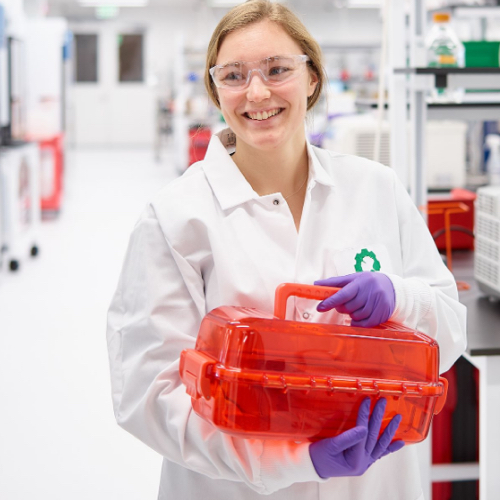Watch the Event
A recording of the Virtual Event, Functional Food Proteins with Microbial Expression Systems, is available here.
Foundry Services for Functional Proteins
On June 30th, Ginkgo hosted a live virtual event to present our latest strain engineering capabilities for food proteins and enzymes. These capabilities support our offering of R&D services for the nutrition and wellness industry and are relevant for anyone seeking to produce functional protein ingredients with precision fermentation.
Strain Matters: Pichia and Aspergillus
The event featured two of our favorite microbial production hosts, Pichia pastoris and Aspergillus niger. Both of these strains have long been favored for protein and enzyme production because of their high productivity, food-safe regulatory status and ability to grow on low-cost feedstocks.
But not all strains of yeast and fungi can perform at the level required for food ingredient production at scale. A key message of the event was that your strain matters: choosing the correct expression host for your protein product can speed up your development times and decrease your final production costs.
Ginkgo offers proprietary strains of Pichia and Aspergillus that can address many of the common challenges of food protein or enzyme production. Two featured presentations during the event described the relative strengths of each strain and a case study in which the strain delivered for a particular customer’s performance requirements.
Pichia is often preferred as a base strain for its easy engineerability and large genetic toolbox. Andrea Camattari, Senior Director of Organism Engineering, presented a recent project in which Pichia was adapted to produce an iron-binding food protein, using proprietary methanol-free expression systems (20-fold higher expression than methanol based promoters). Several strategies were employed to improve the expression and the localization of the needed cofactors, resulting in a host strain that far exceeded the customer’s production targets.
Aspergillus can produce certain classes of proteins at extraordinarily high titer (120 g/L or higher), but has historically been limited in large-scale fermentations because of its high viscosity. Peter Punt, Distinguished Organism Engineer and Guest Professor at Leiden University, described Ginkgo’s proprietary low-viscosity, proteases knocked-out and “clean” background Aspergillus that can produce food proteins and enzymes in high titer.
Technology Matters: Ginkgo’s Foundry
Strain engineering at Ginkgo, whether in Pichia, Aspergillus, or another host organism, is an integrated process that benefits from the full stack of cell programming technologies available on our foundry platform. Sneha Srikrishnan, Director of Growth, surveyed a range of technological capabilities that we can deploy for a customer’s project.
Metagenomic Protein Discovery: For projects seeking a particular function or enzyme activity, but without a precisely defined sequence, Ginkgo offers a large in-house discovery library of more than 2 billion genes. This library is substantially larger than public repositories and enables the discovery of previously undescribed functional proteins and enzymes.
ML-Guided Protein Engineering: Enzyme Intelligence™ is Ginkgo’s platform for protein engineering employing generative AI and structure-based design. Our protein engineering team is distinguished by the depth of their experience, having delivered dozens of projects across a range of applications, and the large datasets they can access through Ginkgo’s experimental and assay capabilities.
Industry-Leading Automation: Ginkgo has invested almost half a billion dollars in foundry infrastructure, including an expansive robotics platform for automated DNA assembly, transformation, and strain characterization. Data-rich enzyme engineering projects are needed to make the most of data-hungry ML software. High-throughput strategies that can discover rare high-performance variants that can be missed with low-throughput approaches.
Phenotypic Selection with EncapS: The EncapS (Encapsulation and Screening) system allows up to one million strain variants to be characterized in a single campaign. The ultra-high-throughput technology uses microfluidics to package cells in nanoliter-scale droplets, allowing measurement and optimization of secreted protein production. As a screening technique, EncapS can enable strain improvement even without targeted genetic modifications.
Experience Matters: Success-Based Pricing
The depth of Ginkgo’s experience in protein and enzyme production projects gives us a unique confidence in our ability to meet our customers’ performance targets. Alyssa Blaize, Director of Growth, presented our new Success-Based Pricing model as a way for Ginkgo to “put our money where our mouth is” and to allow our customers to directly benefit from that experience.
Projects that are covered by Success-Based Pricing include enzyme discovery, protein engineering and production optimization projects that are determined to have a high probability of success. Ginkgo and our partner work together to set the performance targets for a particular project. If the performance targets aren’t met, the customer pays no R&D fees.
This presentation included more details about the Success-Based Pricing model and a project flowchart highlighting decision points and cost structures at each phase. With Success-Based Pricing, customers are able to lower their technical risk and minimize their financial exposure to the traditional uncertainties of biology R&D.
